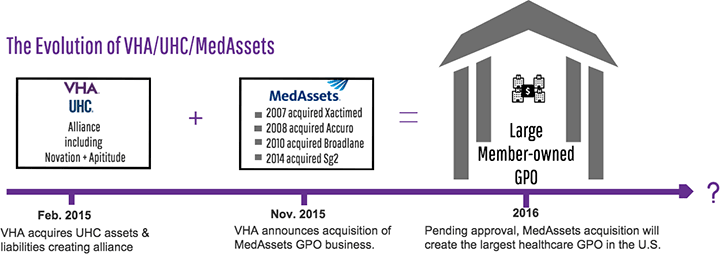
The recent announcement that VHA/UHC will acquire the MedAssets Supply Chain Management business is the latest in the rapid consolidation of the GPO industry, and it's unlikely this will be last news of this kind.
Is this a good development for your healthcare system? What does the world of healthcare sourcing look like with ever larger GPOs on the horizon?
For one thing, it means fewer choices – just like the insurance and airline industries, fewer players mean health systems don't have as many choices.
And while the creation of larger health systems helped to create this problem, the response from GPOs to get bigger fails to meet all the needs of those large health systems. While larger GPOs have more purchasing volume which, in theory, translates to lower prices, the question remains: as healthcare systems continue to merge creating their own economies of scale, how much of an price advantage does even the largest GPO provide mega-systems?
Mega-systems complain that their purchasing volumes subsidize small member hopsitals. In response, mega-systems are creating their own purchasing groups to recoup 100% of the administrive fees not only for themselves, but for smaller hospitals and systems in their regions.
As the need for traditional volume aggregation goes down, healthcare systems increasingly rely on additional services provided by GPOs like purchased services consulting, predictive analytics. How innovative and responsive are large GPOs going to be to these needs of all but the largest of their customers? How will GPOs be paid for these new solutions and services if rebate fees from transitional GPO administrative fees are not available to pay for them? Will you increasingly feel "nickel and dimed" to gain the services and software you need?
As healthcare systems grow in size, the proportion of their spend that is locally sourced has been increasing. Large GPOs do little to benefit healthcare systems with scale economies for local sourcing except by subsidizing these services through rebates from nationally contracted spend volume.
How will large GPOs help you to address your local sourcing needs helping this function to scale over time within your organization?
For more insights on how to optimize your Purchased Services spend for greater and faster savings, subscribe to our blog today.
